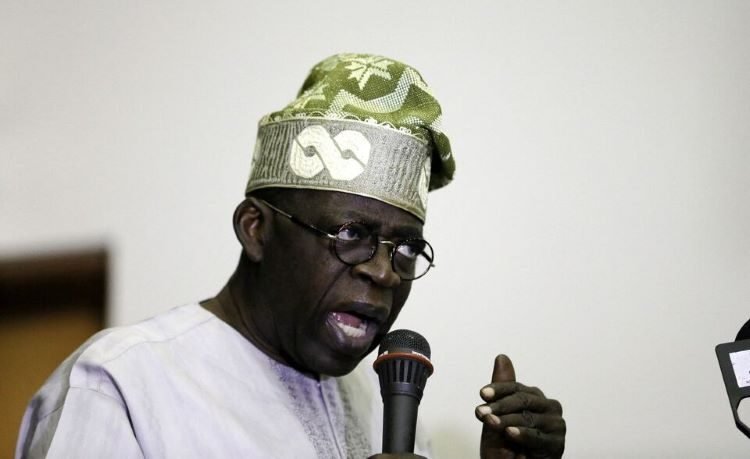AS the National Assembly moves to alter Nigeria’s 2027 general election timetable, an old speech by President Bola Ahmed Tinubu was sighted by News Point Nigeria, one in which he fiercely opposed a similar legislative move over two decades ago, warning it could lead Nigeria toward an “authoritarian state.”
The renewed debate comes after the Senate and House of Representatives began consideration of the Electoral Act (Amendment) Bill 2025, which proposes shifting the next presidential and governorship elections from early 2027 to November 2026.
If passed, the bill will require that all general elections be held no later than 185 days before the expiration of the incumbent’s tenure, bringing the exercise forward by about six months.
While many Nigerians view the amendment as a welcome step toward resolving post-election disputes before winners take office, critics say it risks compromising the constitutional independence of the Independent National Electoral Commission (INEC), the very concern Tinubu raised in 2000 when he served as Lagos State governor and opposition leader.
In a fiery statement at the time, Tinubu, then a leader of the Alliance for Democracy (AD) and later Action Congress (AC) cautioned the then-PDP-controlled National Assembly against usurping INEC’s powers, accusing lawmakers of attempting to “customize” Nigeria’s democracy to their advantage.
“You look at the National Assembly making laws in a customized and personalized form and not the constitutional way,” Tinubu had declared.
“Taking away the independence of INEC, when you say this is an independent institution, you are taking their independence away by ordering elections, organizing the order of elections, and legislating for them. There are all sorts of charades by the majority party in power.”
Tinubu went further, describing the legislature as an “imperial court” and warning that such moves could erode democratic institutions.
“You see the problem of lawmaking outside the constitution again, it is tailor-made,” he said.
“The constitution of the Federal Republic of Nigeria says political parties must have their own constitutions and operate on internal democracy. But here we have a legislative body making laws for parties that are not their own.”
He vowed then that his party would not hesitate to take the National Assembly to court to defend the constitutional rights of opposition parties.
Fast forward to 2025, and the same debate has returned this time under Tinubu’s own administration.
Political observers and social media commentators have pointed out the irony that the current National Assembly, dominated by the ruling All Progressives Congress (APC), is now pursuing the same kind of amendment that Tinubu once decried.
A Political Science Professor in Kano told News Point Nigeria that the resurfacing of his remarks has reignited discussions about political consistency and the balance of power between the legislature and INEC.
A constitutional lawyer, Ibrahim Bala, also noted that while the intent behind the amendment may be noble, it treads a dangerous path.
“If the National Assembly starts setting election dates by law, it could politicize INEC’s autonomy, which Tinubu himself warned against decades ago,” Bala said.
Despite the controversy, several legal and political experts have backed the lawmakers’ initiative.
They argue that early elections would allow sufficient time for petitions and appeals to be concluded before elected officials are sworn in, a move that could strengthen electoral credibility.
Adewale Bolaji, a lawyer and Lagos State chairman of the Action Democratic Party (ADP), said:
“It is a plus for our democracy. Many election petitions drag on for months after inaugurations. This amendment will ensure a fair process and prevent incumbents from influencing tribunal outcomes.”
An APC chieftain who spoke anonymously shared a similar view, stating that “it’s a great idea that could ensure justice is done before power changes hands.”
In defense of the move, Senator Ahmed Musa, Chairman of the Senate Committee on Electoral Matters, dismissed claims that the National Assembly was trying to undermine INEC.
“Having court cases dragging on after inaugurations undermines public trust,” he said.
“This reform will restore confidence in the democratic process by ensuring petitions are resolved before anyone takes the oath of office.”
The bill also proposes mandatory electronic transmission of results, early voting for journalists, security operatives, and election officials, and revised tribunal timelines, 90 days for initial rulings and 60 for appeals.
Some politicians, however, fear that the change could plunge Nigeria into a cycle of constant electioneering.
“We must not turn the country into a place where elections dominate governance all year round,” said one senior opposition figure from Adamawa. “INEC already has constitutional authority to set election dates, the National Assembly should not micromanage that.”
Others have argued that the reform, though well-intentioned, might distract from governance priorities and could even be exploited for political advantage.
Two decades on, Tinubu’s old warning about legislative overreach has resurfaced as a test of principle for his government.







